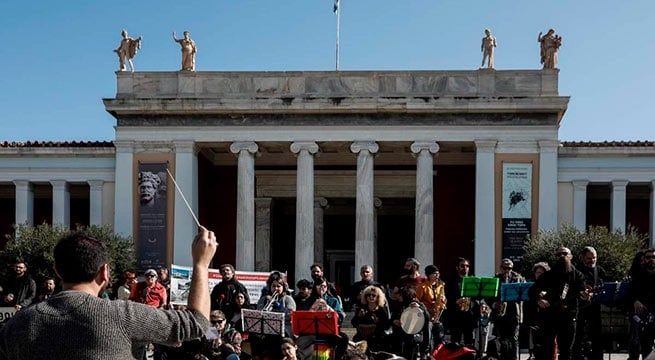The five largest public museums in Greece were closed on Monday, 13 February, due to a 24-hour strike by the Association of Greek Archaeologists.
The National Archaeological Museum of Athens, the Byzantine and Christian Museum, the Archaeological Museum and the Museum of Byzantine Culture of Thessaloniki, and the Archaeological Museum of Heraklion in Crete are closed.
Archaeologists are protesting against a bill submitted by the Ministry of Culture and expected to be voted on in Parliament today. The bill concerns changing the status of museums as legal entities under public law (PLL/NPDD). Protesters held rallies outside several museums on Monday morning and also announced more about two continuous strikes on Tuesday and Wednesday, 14 and 15 February.
At the same time, the Association of Greek Archaeologists announced that it would appeal the new law to the Council of State until a decision was made and would not recognize its legitimacy.
What changes in museums with their conversion to NPDD? The draft law of the Ministry of Culture and Sports, put to the vote in Parliament today, makes significant changes to the long-term mode of operation of the five largest state museums in the country by transforming them into legal entities under state control. Law (PLL), as they are, that is the Acropolis Museum.
The main changes concern the administrative status of individual museums. They will no longer be run exclusively by civil servant archaeologist managers, as was the case until today, but by composite boards of directors appointed by the Minister of Culture, with no requirement that they be archaeologists.
In particular, three members of the council will be recognized authorities in the field of art, literature and science, and two from the Ministry of Culture. Individuals distinguished by their successful professional and social activities will be appointed President and Vice President. The director general of the museums will approach this seven-member board for approval on any issue related to their work.
In addition, under the new regime, the five museums will themselves manage the resources they collect from tickets, sales, events, etc., which have so far been collected by the Organization for the Management and Development of Cultural Resources (ODAP) and are expected to they will be self-financed.
In addition, they will have the opportunity not only to borrow and borrow works for five years with the possibility of renewal, but also to open branches in foreign countries in order to exhibit some of their collections in the long term.
However, the insurance regime for movable antiquities will also change, as for the first time, a system of state guarantees will be created that will free museums from the exorbitant costs of private insurance premiums.
As for museum workers, if they want, they will remain in their positions, and other full-time positions will be opened that will not be addressed to employees of the Ministry of Culture.
Minister of Culture Lina Mendoni speaks of a “necessary modernization”.


